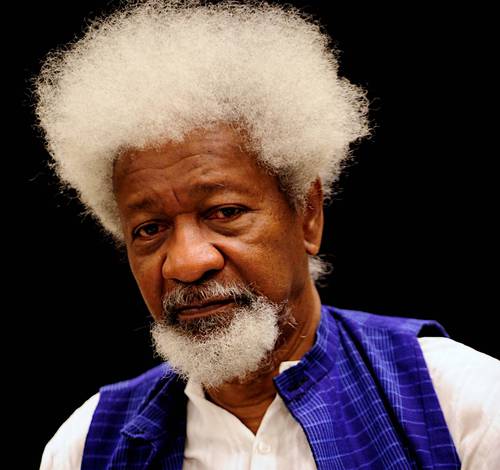
Akinwande Oluwole Babatunde Soyinka popularly known as Wole Soyinka, He is one of contemporary Africa’s greatest writers. Also, one who advocates for native culture and of the humane social order. He was born on July 13, 1934, in Abeokuta near Ibadan. His father Samuel Soyinka was a prominent Anglican minister and his mother, Grace Soyinka popularly called ‘Wild Christian’ was a shopkeeper and local activist.
Wole Soyinka grew up in an Anglican mission compound where his parents ensured that Christian upbringing and his regular visit to their ancestral home was balanced. He learnt the Yoruba spiritualism as well as the tribal customs of his grandfather. He was a child with exceptional skills, who will always ask questions due to him being inquisitive.
At the age of twelve, he left Ake for Ibadan where he attended Government College. He deferred entering the University after leaving college and moved to Lagos to work in an uncle’s pharmacy for two years. During this period, he started writing plays for local radio.
In 1950, he got admitted into the University of Ibadan. In 1954, his attention was focused on theater, he then travelled to England to complete a degree at Leeds where he served as the school’s magazine editor, The Eagle. He graduated in 1957 and extended his European apprenticeship by working as a script reader, an actor and the director at the Royal Court Theater in London.
It was this period that he started working on his first major plays, ‘The Swamp Dwellers’ and ‘The Lion and the Jewel’ was accepted by the Royal Court Theater in London. They were successfully staged in both London and in Ibadan. At the age of 26, Soyinka returned to Nigeria. His next major work was The Trial of Brother Jero.
Soyinka then received a Rockefeller Foundation grant to research traditional performance practices in Africa in 1960. Soyinka joined the Faculty of English at the University of Ibadan where he formed a theater company called 1960 Masks, where there was the production of topical plays, employment of traditional performance techniques to dramatize the issues that arose from Nigeria independence.
The result of the 1964 regional election was set aside such that a candidate that was favoured by the central government could claim victory. Soyinka with some friends forced their way into the local radio station where he was able to substitute a tape of his own for the recorded message that was prepared by the fraudulent winner of the election. This led to his arrest, he was detained for two months and later released. Upon his release, he was appointed at the English Department of Lagos University where he completed the comedy, Kongi’s Harvest.
Although he was welcomed well back into the country, his play, ‘A Dance to the Forest’ placed him on odds with Nigerians that were in power because it satirized the Nigeria political elite. Soyinka, a political activist appealed in an article for a cease-fire during the civil war in Nigeria. This led to his arrest in 1967 and was held for 22 months until 1969.
By the end of 1969, at this time the war was virtually over. The Biafran insurgency has been defeated by Gowon and the Nigeria federal army, amnesty was declared and Soyinka was released. Soyinka then returned to Nigeria to head the Department of Theater Arts at the University of Ibadan. The 1970s were productive for Wole Soyinka, he wrote one of his most satirical plays, ‘Madmen and Specialists’, ‘The Man Died’, his prison memoir was published in 1972 which was then followed by a novel, ‘The Season of Anomy.’
In 1975, Gowon was deposed and Soyinka was confident to return to Nigeria where he became Professor of Comparative Literature and Head of the Department of Dramatic Arts at the University of Ife. Soyinka called his musical allegory of crime and his political corruption ‘Opera Wonyosi’. He started a new theatrical troupe, the Guerilla Unit to perform improvised plays on topical themes.
In 1986, he was awarded the Nobel Prize for literature despite the trouble he’s been facing in his own country. He never lost his reputation in the outside world and rather than dwelling on his own work or the difficulties he’s been facing in his country, he sometimes writes of modern West Africa in a satirical way.
He has taught in a number of America universities which includes Emory University in Atlanta, Las Vegas University of Nevada and Loyola Marymount in Los Angeles. Since he moved to the United States, he has written “King Baabu’, ‘Samark and other Markets I Have Known’, ‘a volume of verse’ and ‘You Must be Set Forth at Dawn (2006).’
The presidential election that was conducted in 2007 was denounced as illegitimate by Soyinka due to ballot fraud and the widespread violence on the Election Day. He also taught at the University of Harvard, Yale and Oxford. He was a Scholar at Duke University in 2008.
He was awarded the Europe Theatre Prize in the ‘special prize’ category which is always awarded to someone who has ‘contributed to the realization of cultural events that promote understanding and also the exchange of knowledge between people’ in December 2017.
Wole Soyinka described the Western Nigeria Security Network (WNSN) code-named Operation Amotekun as a fulfilment of what the people yearned for. He said the initiative is a desirable New Year gift.





